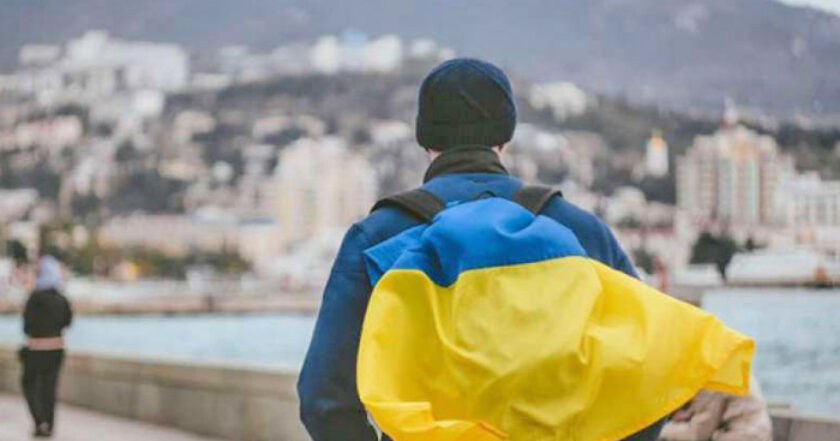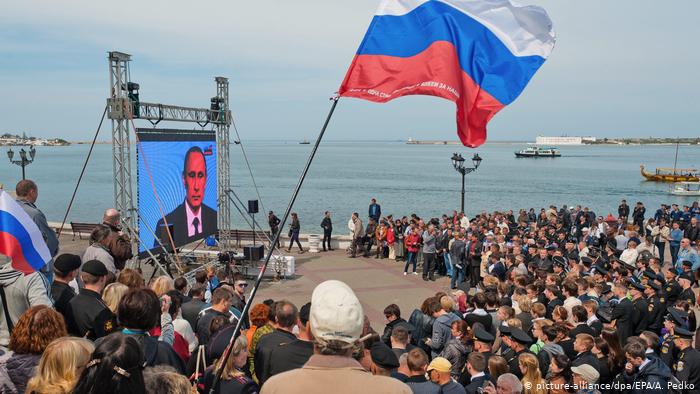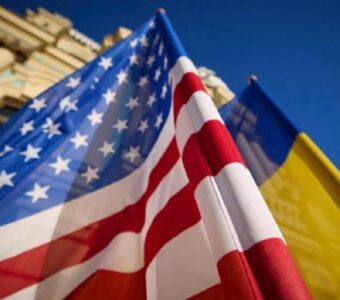Returning Crimea: how Ukraine is fighting for the occupied peninsula

Photo Ukrinform
Exactly seven years ago, on March 16, 2014, Russia held an illegal pseudo-referendum in Crimea, the official results of which Russia used as an argument for the final annexation of the peninsula. It was then that it became clear that Vladimir Putin wouldn't surrender the occupied peninsula voluntarily.
And this year, on the Day of Resistance to the Occupation of Crimea, President Volodymyr Zelenskyi stated he believed he'd witness the return of the peninsula. We analyze what Ukraine is doing for it to happen (and how Russia is responding).
"The statistics are disappointing" has been a brief description of the situation with the occupied peninsula for 7 years after its annexation. Compared to 2014, Ukraine hasn't got under way in returning Crimea (Russia has made no concessions). The reason is obvious when comparing the military forces of the two countries.
Thus, in Crimea, citizens suffer from a lack of water (it's given to them on an hourly basis, but dirt still flows from their taps), and because of the economic crisis, Crimeans spend an average of 70% of their earnings on food. However, more than 2 million peninsula residents are still "sitting at home" and don't protest. After Navalnyi investigated Putin's palace in Simferopol, only about 200 citizens took to the streets.
"I'll explain: the people who remained in Crimea, who are against this regime, are afraid because the memory of the tanks that stood here is still fresh," one of the protesters told Radio Svoboda (and regime supporters are simply grateful to Putin for "rescue" from the Right Sector).
Russia is still able to hold Crimea, but pro-Ukrainian residents often have to leave
The Kremlin has had enough strength to hold the peninsula. The figures are further: in 2017, Crimea cost Russia 3-5 billion dollars annually (it's unlikely that it "came down"). According to Bloomberg, another $150 billion has been shaved off with sanctions over the years. By comparison, the Russians boast that they have $587 billion in reserves, which will be enough for several decades of occupation. And Vladimir Putin is simply ready to endure the problems of the Crimean people and the consequences of sanctions.
As a result, it's not the occupiers who are forced to leave the peninsula, but pro-Ukrainian Crimeans. According to Eskender Bariiev, the Head of the Crimean Tatar Resource Center, more than 60,000 people have moved to other regions of Ukraine, while 109 Ukrainian citizens remain in Russian prisons as political prisoners (mostly Crimeans).
By the way, opponents of annexation are, in fact, unable to liberate Crimea on their own, so repression is more like trying to "squeeze" dissenters from the peninsula. "They've created conditions under which Crimean Tatars are kicked out from the peninsula: criminal and administrative cases are opened, people are kidnapped," Tamila Tasheva, the chairperson of the CrimeaSOS board commented.
The good news is that our allies, the United States and the EU, certainly don't recognize the annexation of the peninsula. "Crimea is Ukraine. The United States doesn't recognize and will never recognize Russia's attempt to annex the peninsula, and we'll work with Ukraine against Russia's aggressive actions," US President Joe Biden said on February 26. Voting at the UN on Crimean issues is also in favor of Ukraine.
Ukraine, meanwhile, seeks to gather an international coalition to return Crimea… and not only within the UN
"[Ukraine has] tactical tasks. The first is how we keep the occupied Crimea on the strategic agenda so that this issue isn't forgotten," Ukrainian Foreign Minister Dmytro Kuleba said earlier. The Minister explains that the "Navalnyi case" is new and on the lips of Europeans, so Russia receives sanctions, but the EU doesn't punish Moscow for repressions against Crimeans.
It seems that the President's Office believes that they've found a way out of the situation: creating a new negotiating platform on the "Normandy format" model. Thus, on February 26, Volodymyr Zelenskyi signed a decree on launching the so-called "Crimean Platform."
The idea resembles the "Normandy" format, given the government's plans. At such meetings, Ukrainian officials will agree and coordinate actions with allies, inform the world about the repression on the peninsula, and present an "action plan" for the return of Crimea (everything for the sake of putting pressure on Russia). Work on the platform continues. There's even a date for the first meeting: August 23 this year.
"The platform will become a multi-layered organism that will work simultaneously at four different levels: heads of states and governments, foreign ministers, members of parliaments and experts," Deputy Foreign Minister Emine Ceppar announced.
Next, the Foreign Ministry wants to support the "Crimean Platform" with an international expert network. As our diplomats imagine it, Ukrainian and international experts, researchers, and journalists will be members of the informal community and besides the major work, they'll prepare analytical materials for the platform or tell the world about it.
In short, this format is becoming the main one for Ukraine. At the same time, our government doesn't abandon the time-tested means of pressure on Russia: appealing to the allies for sanctions, holding international discussions, or suing in the European Court of Human Rights (just in January this year, the ECtHR accepted our complaint against Russia).
Good news: the "Crimean format" is becoming the principal one, and the number of participants is growing
If during the presidential campaign, Zelenskyi was criticized for the lack of a strategy for Crimea, now the Ze-Team uses all possible levers. The Crimean issue is discussed at NSDC meetings, and high-ranking officials often mention the peninsula in speeches. Whether it proves the Office's intention to fiercely oppose Russia or an attempt to restore the trust of disappointed voters, it's up to the citizens.
In any case, as of mid-March, the Foreign Ministry is succeeding. Thus, participation in the Crimean Platform was confirmed by Turkey and France. According to President Zelenskyi, representatives of the United States, the European Union, Canada, and the United Kingdom also promise to join. Among our neighbors, it will be Slovakia and Moldova.
There may be even more participants: Ukrainian diplomats are actively inviting new allies, and the president says there are "many" willing to join. NATO Secretary-General Jens Stoltenberg doesn't rule out participation in the summit, while People's Deputy Mustafa Jemilev speaks of good reasons to wait for US President Joe Biden on August 23 in Kyiv (the White House hasn't confirmed yet).
What will they talk about? Earlier, Kuleba announced: our country will raise the issues of freedom of navigation, the effectiveness of sanctions, protection of human rights, including cultural and religious ones (read: persecution of Crimean Tatars and Ukrainians in Crimea). And we'll explain to the allies about the damage to the economy and the environment of the peninsula from the occupation (the Crimean people suffered from the annexation).
There's a problem, though: Russia doesn't want to participate
However, one problem of the Crimean Platform remains unresolved: unlike the Normandy format, Russia has made no commitments. And it doesn't want negotiations with Ukraine at all.
More precisely, the Kremlin agrees to join by word of mouth, but in exchange, demands to change the subject, and discuss not "how to return Crimea to Ukraine," but, for instance, water supply or "transport problems" of the peninsula. It seems that it's a reason for Putin to eventually take offense and leave.
Therefore, Russia won't sign an agreement with Ukraine, and it'll be impossible to bring it to justice for unfulfilled promises. Meanwhile, Washington and Brussels haven't promised to support the Crimean Platform case with new sanctions for non-compliance yet. So far, they have only agreed with the allies on a joint charter where all countries will confirm that Crimea is Ukraine.
And if anyone doubts the Kremlin's intentions, the Russians are ostentatiously arranging new "sweeps" on the peninsula. On February 17, security forces of the aggressor country conducted searches in the homes of Crimean Tatars, and detained six people for the alleged "terrorism." And on March 3, a court in Rostov-on-Don jailed a Crimean citizen, Oleh Prykhodko, who publicly criticized the occupation of Crimea and hung a blue-and-yellow flag over his home.
Putin's regime responds to Ukraine's plan with blackmail and brute force
When it didn't work out on the diplomatic front, the Kremlin strategists changed tactics. Instead of convincing the world that the Crimean people wanted to join Russia, the Kremlin simply wants to force the EU or the United States to silently accept the annexation.
So, lately, the Russians are turning the region into a large military base, bringing their most modern weapons there (it's besides tens of thousands of soldiers and navy). Ukrainian and Russian media reported on an entire arsenal on the peninsula: S-400, Bal and Bastion missile systems (the latter two are anti-ship), Pantsir-S anti-aircraft guns, and 100 combat planes. In 2020, Ukraine's Defense Minister Andrii Taran claimed Russia was preparing to deploy nuclear weapons in Crimea.
It's unlikely that the Kremlin is afraid of an attack by the Armed Forces of Ukraine, rather, the primary task of this armada is to intimidate Europeans and Americans. After all, the Kremlin shows the world its own power and has reason to say: there are nuclear weapons and modern missiles. And if you threaten Russia, someone could start firing, and another "flash spot" will appear on the sidelines in the EU.
Also, they want to replace the population of Crimea with loyal Russians
It seems that the Kremlin's offices have found another method of "fixing" the peninsula: to populate it with Russians. According to People's Deputy Mustafa Jemilev, about 500,000 "settlers" from the Russian Federation may already live in Crimea. According to other data, it's up to one million people. If you add up the media data, it's mostly the military, security forces, civil servants, and their families. It's logical to assume that they support the Putin regime, otherwise they wouldn't have taken part in it.
And now Moscow is massively attracting civilians to the peninsula. Thus, back in 2019, the Russian National Commercial Bank (a state-owned bank operating in the occupied Crimea) began issuing special loans in Siberia: 11.5% per annum for Russians who want to buy housing on the peninsula. The "Crimea.Realities" publication quotes the head of the real estate agency from Simferopol Dmytro Maiorov, who claims the demand for housing is high, and people "rushed to buy apartments."
The Kremlin has even prepared programs under which residents of mainland Russia can take a loan for real estate in Crimea at 4.5%-6.5% (!) per annum. So Putin is clearly deliberately inhabiting the peninsula with ethnic Russians and seeking to use them as a "living shield."
After all, by "Russifying" the peninsula by the Russians, the Kremlin will be able to manipulate this fact at the UN or in talks with Joe Biden. It's impossible to return the peninsula to Ukraine because for hundreds of thousands of Crimeans, it's a foreign country, they seem to be oppressed, and the war in Yugoslavia will repeat (Russian propaganda loves this topic).
Plus, Moscow demotivates Ukraine itself: what's the point of returning to Crimea if there are hundreds of thousands of settlers loyal to the Kremlin and unfriendly to Ukraine?
That's why Ukraine is winning strategically, but we have a long way to go
Although the Ukrainian formula "sanctions + diplomatic pressure" hasn't returned Crimea to us yet, experts praise it. According to Eurasia issues expert and State Department ex-analyst Paul Goble, Russia's position on the peninsula is weakening: "As a result, more and more people in Russia… will conclude that Crimea has become a 'handleless suitcase' for Russia: too valuable to give up, but unbearable at the same time. And Crimea will eventually be able to return to Ukraine."
Besides, the process is so long that no expert predicts the date when the blue and yellow flag will rise over Simferopol. "As long as this person [Putin] doesn't decide to end the war on the territory of Ukraine, no agreement will work with anyone. That's the point," Oleksii Danilov, Secretary of the National Security Council of Ukraine, stressed. So for now, the "small steps" tactic remains.


























































